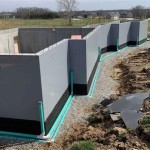The Essential Aspects of Basement Addition Costs
Transforming your home by adding a basement can significantly enhance its living space and value. However, it's crucial to carefully consider the costs involved before embarking on this substantial project.
The cost of adding a basement varies substantially depending on factors such as the size and complexity of the project, materials used, labor expenses, and local permits. To provide a comprehensive understanding, we will delve into each of these elements in detail.
Size and Complexity
The size of your proposed basement directly impacts its cost. Larger basements require more materials, labor, and excavation work, resulting in higher expenses. Moreover, the complexity of the design, such as the incorporation of additional rooms, a separate entrance, or unique architectural features, can further escalate the cost.
Materials
The materials you choose for your basement, including the walls, flooring, insulation, and finishes, significantly influence the overall cost. High-quality materials typically come with a higher price tag, but they also offer durability, energy efficiency, and aesthetic appeal. Balancing the cost and benefits of various materials is essential for making informed choices.
Labor Expenses
Labor costs constitute a significant portion of the total basement addition cost. The number of contractors, skilled tradespeople, and laborers required for the project, as well as their hourly rates, impact the overall labor expenses. Hiring experienced and reputable professionals ensures a high-quality basement, but it also comes with a premium cost.
Local Permits and Inspections
Obtaining building permits and passing inspections are mandatory requirements for basement additions. The complexity of the project and local regulations determine the number and cost of permits required. It's imperative to factor in these expenses and ensure that all necessary permits are secured to avoid costly delays and potential legal implications.
Additional Considerations
Besides the primary factors discussed above, several other considerations can affect the basement addition cost. These include:
- Excavation and soil conditions: Hard soil or the presence of bedrock can increase excavation costs.
- Utility connections: Extending plumbing, electrical, and HVAC systems to the basement adds to the overall cost.
- Drainage and waterproofing: Proper drainage and waterproofing systems are essential to prevent water damage and ensure a dry and habitable basement.
- Contingency fund: It's prudent to set aside a contingency fund to cover unexpected expenses or unforeseen circumstances.
By thoroughly considering these essential aspects, you can gain a realistic understanding of the potential costs associated with adding a basement to your home. Remember, it's always advisable to seek professional advice from experienced contractors and architects to obtain accurate cost estimates and ensure a successful project outcome.

Cost To Finish A Basement In 2024 Forbes Home

Should You Build Your Home Up Down Or Out Reinbrecht Homes

Cost To Build A Basement In Chicago New Construction

The Plan And Cost Of Adding A Basement Bathroom

The Cold Hard Numbers Cost To Finish Basement

Cost To Build A Basement In Chicago New Construction

Is It Cheaper To Build A Second Story Or Basement Mbc Remodeling

Separate Entrance To Basement Cost Reno Duck

Separate Entrance To Basement Cost Reno Duck

Average Cost Of Basement Entrances In 2024 Forbes Home








